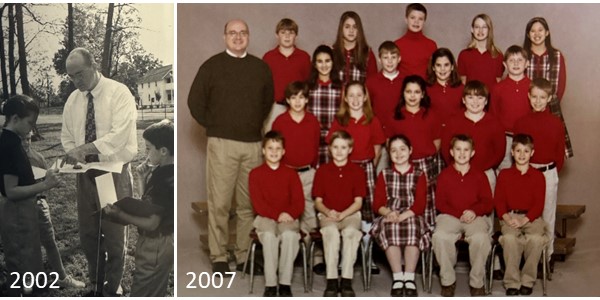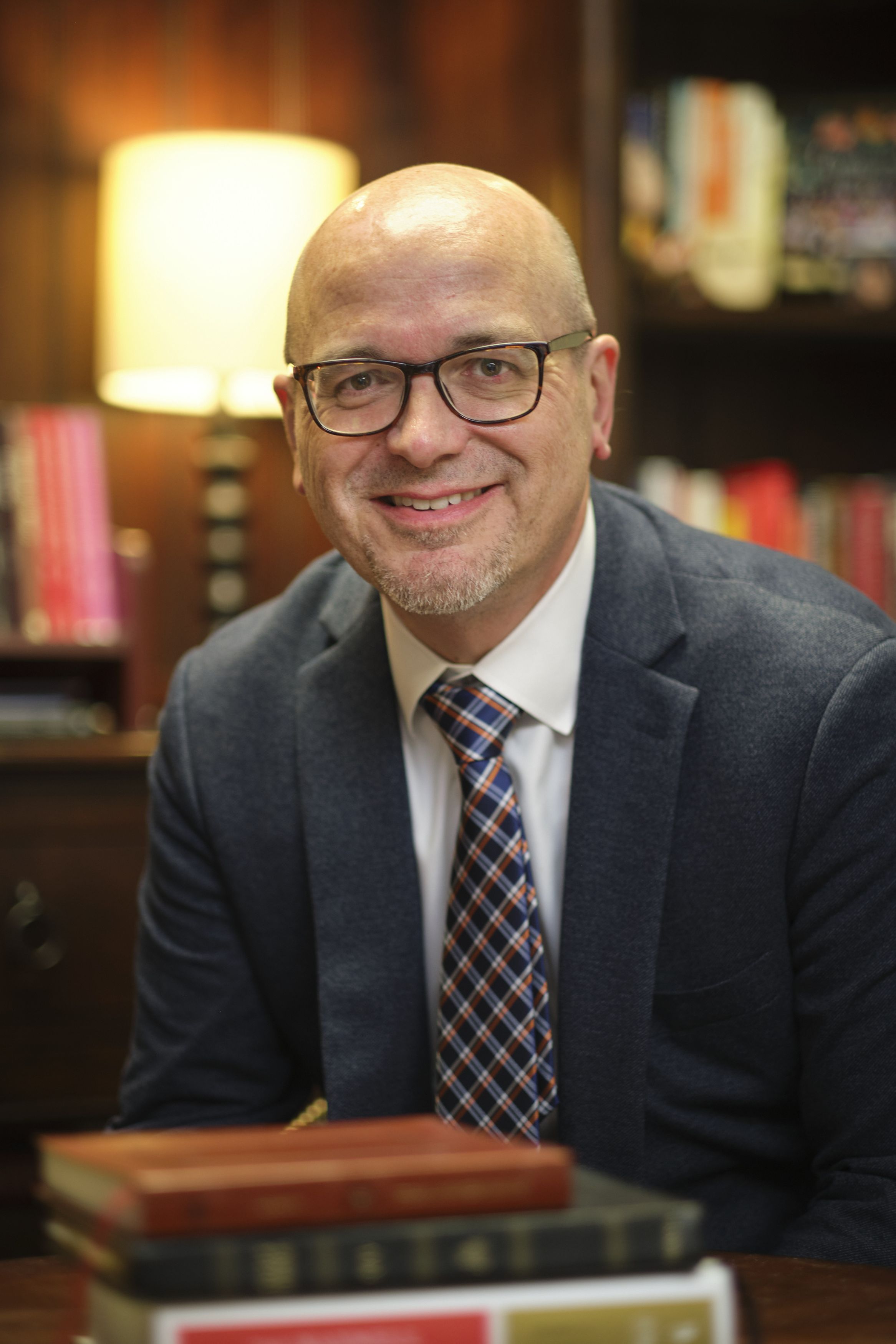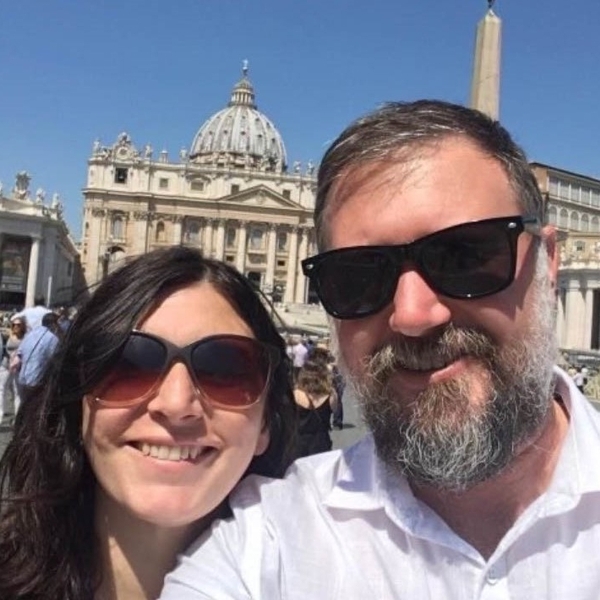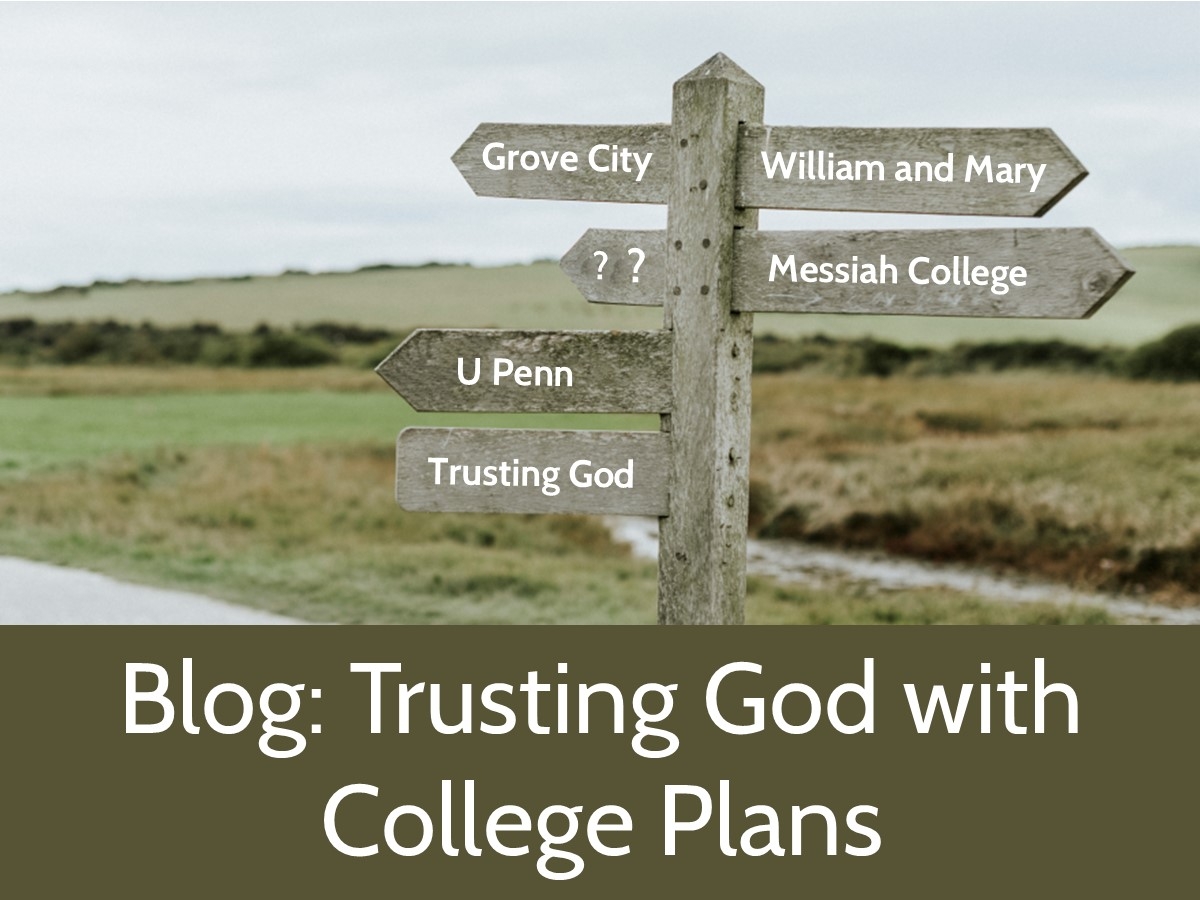Rockbridge Academy Blog
28 Faithful Years of Life Together

Mr. Roy Griffith, our headmaster, started his journey at Rockbridge Academy in 1997 as a 5th grade teacher joining this start-up classical Christian school. That marked the third year of the school and already it had grown from 23 students the first year to nearly 100. Few people had ever heard of classical education and even fewer of classical Christian education (CCE). Rare indeed were those willing to stake a career on it when no Rockbridge graduates even existed, and we had never taken a Grand Tour before.
Did this educational methodology actually work? We know the answer today is a resounding, yes, as CCE is now a fast-growing movement. But what was Mr. Griffith thinking 28 years ago? What led him to change careers from an architect to 5th grade teacher? What changes has he seen in CCE, and how is Rockbridge Academy poised to approach the next 30 years? Mr. Griffith shares his story, some of the challenges of the early years, and some words of advice to those just starting their classical Christian educational journey at Rockbridge Academy.
What were you thinking 28 years ago when you changed careers from an architect to a 5th grade teacher with four young children?
When I came to Rockbridge Academy, my wife, Donna, and I were chasing our first two of eventually, four kids and were deep into learning how to parent as Christians. Ever since we had brought our oldest home from the hospital, one thing persistently tugging on our souls was the conviction that if Ephesians was telling us to bring up our children, "in the fear and admonition of the Lord," it required us to be all in. We quickly awoke to how central education would be to forming not just their minds but the heart convictions our kids would carry into adulthood. So when I visited Rockbridge Academy during their opening year in 1995, I walked in thinking about an eventual school for my boys, but walked out personally captivated by the classical Christian vision. A thoroughgoing K-12 discipleship of the mind and heart anchored in the sovereignty of Christ and embracing the role of the whole family resonated in my soul. Months later, I couldn't get that vision out of my head, and I really believed the Lord gave me a burning desire to be part of that mission as a teacher. It wasn't an easy decision, as it meant long hours and a significant pay cut. When I proposed the career change to my wife, she responded wryly, "Well, we can try anything for a year." It was a defining moment. God has His ways, as one tentative year turned into twenty-eight.
So when I visited Rockbridge Academy during their opening year in 1995, I walked in thinking about an eventual school for my boys, but walked out personally captivated by the classical Christian vision. A thoroughgoing K-12 discipleship of the mind and heart anchored in the sovereignty of Christ and embracing the role of the whole family resonated in my soul.
How did you experience God's faithfulness as you took these steps of faith?
The early years were hard but rewarding. I had never before thought I would be a teacher, or thought I had a knack for it. But the Lord hollowed out a little space just for me, and I flourished in the classroom. At the same time, like many start-up Christian schools, all the teachers at Rockbridge literally worked below the poverty line, which had its own stresses. Meanwhile, God surrounded us with a precious school community who cared for our family. Food would show up at our door unannounced. Families took us along on their vacations. I remember one Christmas, a Rockbridge family left a gift anonymously at our front door each night for two weeks leading up to the holiday. We tried hard to catch them in the act, but they were really stealthy. It was both hilarious and heartwarming, and while we had our suspicions, we never found out who it was. My kids were spellbound by the surprise each night. Through it all, both the rewarding moments and the times of greatest stress and difficulty, we look back and see the Lord's hand. As I've come to realize, when God called us to this, He began a discipleship not just of my kids, but of our whole family.
Through it all, both the rewarding moments and the times of greatest stress and difficulty, we look back and see the Lord's hand. As I've come to realize, when God called us to this, He began a discipleship not just of my kids, but of our whole family.
What were some of the challenges you and those early teachers and administrators faced?
The greatest challenges by far came because none of us had been classically educated. While we were standing on the shoulders of a few slightly older schools trying to do the same thing, everything had to be built from scratch. From curriculum and lesson plans to traditions like feasts and history parades, to figuring out how to shape distinctively classical and Christian music and athletics programs, teachers and administrators were constantly trailblazing. Pioneering is tiring, often hard on relationships, and always fraught with mistakes. We look back on lots of mistakes. (We still make mistakes.) I think the Rockbridge Academy Core Values we articulated distilled from many hard-fought lessons in those early years and helped define who Rockbridge Academy has always aspired to be.
Have you seen the classical Christian education model change over the last 3 decades?
I would say that the classical Christian model itself has not fundamentally changed in three decades. Rather, I think our collective understanding of this education, one that had to be recovered from the distant past, has grown tremendously. In light of that fact, I think we have learned to approach the act of educating classically far more humbly than we used to.
Some would argue that true classical education cannot exist without Christ. What are your thoughts?
At the risk of losing any of our aforementioned humility, I'd say, "absolutely!" But to back up, answering this question requires us to think historically. Certainly, the educational model of ancient Greeks and Romans developed in a pagan context, and those societies raised some of the greatest philosophers and statesmen in Western History. Early Christians saw what a powerful tool the Greco-Roman culture had developed. But they also realized that all good things only come by the common grace of the Creator, and that Jesus Christ is sovereign over all knowledge. So what we know today as classical education with all the beautiful trappings is something brought to its fullness in the Christian Middle Ages, which purposely threaded the model with deeper truths of the Scriptures. So, while it's possible to just teach classically, we need to remember how empty the wisdom of the world can be.
How do you see Rockbridge Academy growing and poised to contribute in the next 30 years?
We are in an exciting time in classical Christian education. The resiliency of this model of education compared to others became very apparent during COVID, so classical Christian schools and homeschool tutorials are now popping up everywhere and flourishing. Because Rockbridge Academy has almost 30 years of trial and error in this space, God has positioned us to have a leading impact on this part of God's kingdom. In many ways, that is already happening through our Summer Teacher Training Conference, hosting classical Christian student teachers, and our semi-annual spring ACCS Auxilium conference for start-up schools. We are actively collaborating with greater organizations like ACCS (Association of Classical Christian Education) and SCL (Society for Classical Learning) to expand upon that influence. But as we too experience growth within, our campus is only so big. I tell people, I never want our campus to grow so big that I can't eventually learn everyone's name. So that means further growth could take many forms, including supporting the classical Christian homeschool movement, planting a satellite campus, or expanding specialized programs for both neurodivergent students or students with more profound disabilities. This is why we must remain prayerful. I'm confident the Lord will lead in a way that causes Rockbridge Academy to continue to accomplish its mission to Christian families.
What advice do you have for young families and teachers starting their CCE journey at Rockbridge Academy?
Go to church. Study God's Word. Actively pray. Raise your kids in the fear and admonition of the Lord with intentionality. Love on your children's teachers and get to know them. Walk humbly before God as you figure out who your kids are, and once you think you have, prepare for them to change as they grow. Know that doing all of these things, including sending your child to a Christian school is not a formula for success; it is simply acting as obediently as you can. So finally, trust God with the results of each day and each decade they are under your roof.
 Roy Griffith joined Rockbridge Academy as a 5th grade teacher in 1997. He transitioned to grammar school principal in 2012 and then in 2015 took on the role of interim headmaster to headmaster in 2016. Roy's wife, Donna, has served in various roles in Rockbridge history and today uses her gifts in multiple areas of coaching and care coordination for the elderly. Roy and Donna's four children are Rockbridge alumni: Elyse (2019) living locally and finishing her business degree at UMD, Grace (2018) married to Nathan Harrison (2017) and living in Charlotte, NC, Drew (2015) married to Anna (Krauss, 2015) living in Phoenix, AZ, and Nate (2013) married to Emily (Comeau) and teaching upper school science at Elizabeth Seton High School in Bladensburg, MD.
Roy Griffith joined Rockbridge Academy as a 5th grade teacher in 1997. He transitioned to grammar school principal in 2012 and then in 2015 took on the role of interim headmaster to headmaster in 2016. Roy's wife, Donna, has served in various roles in Rockbridge history and today uses her gifts in multiple areas of coaching and care coordination for the elderly. Roy and Donna's four children are Rockbridge alumni: Elyse (2019) living locally and finishing her business degree at UMD, Grace (2018) married to Nathan Harrison (2017) and living in Charlotte, NC, Drew (2015) married to Anna (Krauss, 2015) living in Phoenix, AZ, and Nate (2013) married to Emily (Comeau) and teaching upper school science at Elizabeth Seton High School in Bladensburg, MD.
Mr. Northup Points to God's Providence

One year ago, Mr. Northup retired from teaching at Rockbridge Academy after being diagnosed with brain cancer. Mr. Northup greatly impacted my life so when I was given the opportunity to write about his life, I took it. This article is dedicated to Mr. Northup and his family for their 17 years of love and support of Rockbridge Academy.
I know many of us are wondering how he is handling the cancer, but more so why he, of all people, got cancer. Mr. Northup was one of the greatest Bible teachers I (and all of Rockbridge) could have asked for. He displayed his faith in every word and deed, and his love for his students and the subjects he taught was unmatched so, why did Mr. Northup get cancer? This question can be restated in this infamous question: why do bad things happen to good people?
That was my main question for Mr. Northup, and he answered it. Before I reveal exactly what he said, make sure to actively look for the providence of God in Mr. Northup’s life throughout the rest of this article.
Mr. Northup was born in Rhode Island and moved to California a year later. At eight years old in California, he dreamed of becoming a real-life Tarzan but he had two problems preventing him from becoming the rope-swinging monkey-man. For starters, he lived in California, and one cannot be Tarzan when climbable objects are limited to a “cactus and a palm tree in the backyard.” This problem was solved when he moved back to Rhode Island the same year where trees grew as commonly as the California cacti. His other problem was more serious: he needed a Jane, but where to find the perfect girl? He did not need to look far; across the street lived the future Mrs. Northup, Merry Dupre. Mr. Northup said that from a young age he knew he was going to marry her. If she made a great Jane, which she did, then she would make a great wife. Obviously, he convinced the girl across the street that he was worth keeping around as they have been married for 27 years and have had five children.
Mr. Northup’s youth in Rhode Island involved street fights and big older brothers. Our teacher was small for his age but hotheaded. He was known for roughhousing and the kids on his street beat him up multiple times. However, they stopped picking on him after Merry’s brother began looking out for him. Her brother was big and strong with a statement 70s hairstyle, a mohawk.
While Mr. Northup had his fair share of fighting, he also spent a good amount of time in church. He was brought to church as a child, but only began searching for God in his teenage years. He told me that, “Everyone at church had a testimony but I didn’t.” Mr. Northup decided to change that by becoming a rebel until he had a good story to tell.
Mrs. Northup said this time was short lived once they had their first child, Samuel, when he was 17 and a daughter, Nadia, at 18. With two children and little stability, Mr. Northup decided to start bringing the family to church, but he made a mistake and joined, as he called it, a “cult” instead. The church that the Northup family joined preached that one’s salvation depended upon their daily missionary work. One had to share the gospel every day to a random stranger to secure their own salvation. Mr. Northup realized that this teaching did not match his understanding of the Bible from his youth. The dissonance between his understanding of the Bible from childhood and what this church was preaching lit his heart afire for God and truth.
Mr. Northup was hungry and curious to know God’s word, so he sought out the youth pastor from the church he grew up in and began a mentoring relationship with him. To make ends meet he worked as a mechanic until he pursued seminary at age 20. He brazenly decided to attend Moody Bible Institute in Chicago. At first, the college rejected him but that did not stop our teacher. He caught a flight from Rhode Island to Chicago to meet the admissions board face to face. He told them, “I am going to come, but how do I do this?” Seeing the passion of this young teacher changed the hearts of the board. Mr. Northup’s grades were not great, and he was behind in the necessary schooling, but his heart was ready to tackle any obstacle presented to him. The college offered him a deal: he would take night classes until he was ready for full admission into regular daytime classes. Eventually, Mr. Northup worked his way up to those daytime classes and even earned a full ride. During this time, he moved his family out to Chicago and received free housing from a nearby church in exchange for his cleaning services. His living costs were low, so he only had to provide food for his family. Thankfully, the window washing business was booming and he received a job cleaning windows for around $100 an hour.
Here, Mr. and Mrs. Northup had their third child, Josiah. After finishing college with a wife and three kids, he moved back to Rhode Island, desiring to impact children’s lives. He first thought about working at summer camps, but a week or two was too short to create a lasting impact. He then considered becoming a pastor, which he did for three years, but he still wasn’t achieving his goal of teaching children. He decided to change careers once more and become a teacher.
The first and only school Mr. Northup taught at was Rockbridge Academy. When deciding where to teach, Mr. Northup and his wife asked the question, “Who do we want our kids to be?” They came upon this one, strange way of teaching called classical Christian Education. They fell in love with the idea of teaching children with a focus on the liberal arts but centered around Christ. Mr. Northup told me concerning classical Christian Education, “This is the way Christians ought to be training their kids.” The Northups found a classical Christian school called Rockbridge Academy which they thought embodied the classical Christian spirit and teaching they desired for their kids. Mr. Northup applied to work here and hit it off with the school board, landing the job for a Bible teacher. He served at Rockbridge for a total of 17 years and during this time, had two more children, Luke and Emma. I asked him which Bible class he enjoyed teaching the most and he answered, “Christ in the Old Testament . . . We get to explore the question ‘where specifically is Christ?’”
Sadly, as we all know, Mr. Northup has left Rockbridge and pursued treatment for his cancer. He said that in these hard times, his wife, Merry Northup, has been his continuous rock and constant companion, a true helper. He is also very grateful for the time he can now spend with his immediate family and his three grandsons. God’s providence, which has shown itself time and time again, is clearly woven throughout Mr. Northup’s life. God has provided in countless ways from protection in his youth to free housing in college and ultimately a job at Rockbridge Academy. To end this story, I want to provide you with Mr. Northup’s answer to the question, “Why do bad things happen to good people?” He said, “This sounds cheap, but I don't think that people are good; I think that God alone is good and He's gracious. I don't expect that I should get things because I'm good or because I'm not. He is. That's one part. The rest is grace. He's been gracious to me with everything from my family to provision. I don't expect that I should be taken care of. Everything is grace. I am grateful for the provision of my family. I can't do anything more than simply be grateful. I don't know if that's the right way to think about it, but that's what I think.”
Hannah Bates is currently in 11th grade and a member of the Rockbridge Review (student-run school newspaper) editorial team.
Letting God Work Through Relational Ministry

Faithfulness over time works wonders in the heart of man. This past summer, I had the wonderful opportunity to experience this firsthand. I traveled to Budapest, Hungary for a month with the Navigators, a worldwide Christian organization.
I learned so much from this trip, but I learned something special—that Hungarians take friendship very seriously. Once you make friends with a Hungarian, you will be friends for life. Because of this cultural norm for friendship, ministry in Hungary is relational. This basically means forming relationships and building trust are a necessary part of sharing the gospel in Hungary.
One sweet example of spiritual conversations stemming from relational ministry happened when my team and I took a trip into the mountains of Slovenia with twenty-three Hungarian college aged students. In most of their minds, this was just a really cool summer camp opportunity. For my team, it was a gateway to relationships, trust, and spiritual conversations. One day, my group was sitting in a beautiful grassy field at the foot of a mountain. As we waited to begin hiking, we split into pairs to discuss the question, “What is trust?” I was paired with Martzi, a student in school studying psychology. He typed me as an extrovert five minutes after he met me. (Who would’ve thought Sarah Williams would be typed as an extrovert? I was proud of that!) I had talked to him a good bit before, so when it came to this question, we were able to jump right in. Martzi is not a believer, but he shared with me that he liked this community because they were different. He felt like he could trust us immediately. “You are all such good people,” he said. “My other friend groups aren’t like this.” As the conversation went on, I explained to him why I am able to trust at all. “Because I put my trust in Jesus,” I said, “I no longer need to lean on my own understanding. He fills my heart, and he is more than I could ever imagine or desire. When Jesus directs my path and I trust Him, He multiplies my ability to extend trust to others and be vulnerable.” Martzi nodded, and we continued talking about his experience in the Christian community. It was such a special conversation stemming from shared trust in one another.
Another example of a memorable conversation happened about a week before we left to return home. In Slovenia, I became friends with a girl named Anna (pronounced like Anna in Disney’s Frozen) who is a fairly new believer. We met on the first day of the camp and after a few days she came up to me and said, “I know we’ve been joking around a lot, but I would really love to be real friends and get to know each other better!” This was so encouraging to my heart. Trust had been built. From that day on, we spent lots of time together. We talked about many things, including the importance of having Christian friendship and community. A few days before I left Hungary, I asked her what she thought of our team coming into her community and then leaving after only a month. “It just seems strange to be here, make friends, and leave,” I said. She looked at me and said something I won’t ever forget. She said, “Just because someone is in your life for a short period of time does not mean that you can’t make a difference to them.” She continued, saying, “It’s like if the people in your life were beads on a necklace. Just like each bead makes some sort of change to your necklace, every person you meet makes some sort of change to you. Even if you only spend one week with someone, you have the ability to make an impact. The bead that represents you on their necklace will never be unthreaded. Therefore, every interaction you have with another person, for however long, is special and important.”
Just because someone is in your life for a short period of time does not mean that you can’t make a difference to them.
I thought about what she said the whole way home. Every interaction I have is an opportunity: an opportunity to impact lives for Jesus. We know the good news of the gospel. In Christ, the joy of Jesus should pour out of us to everyone that we come in contact with. He can and will use us to be the bead in someone's life that makes a difference for the kingdom when we surrender everything to Him.
The best part about this is that you don’t have to travel halfway across the world to do relational ministry! Though I highly recommend that Rockbridge students consider short term missions work, it is first vital that we as Christians and as the Rockbridge community start by focusing on the way we interact with those we see every day. Faithfully showing Jesus to those around us is such a beautiful way to glorify God and enjoy Him. I urge you to think about the way you can share Jesus with those around you. Not just once, but faithfully. Not to build yourself up, but to humbly serve the Lord and build His kingdom.
If any student is interested in learning more about short term missions or what the Navigators ministry looks like on a college campus, my email is sarahkwilliams17@gmail.com. Please feel free to reach out with any questions! I would love to have a conversation with you.
Sarah Williams, '20, is in her third year at Clemson University. She is studying psychology and business management and is planning on pursuing Biblical counseling. She is thankful for the Lord's providence in allowing her to have such beautiful communities both in Maryland and South Carolina.
Trusting God with College Plans

In the fall of 2019, I danced through the halls of Rockbridge with a head held high and a smile secured, for I regarded myself as the early bird who had “gotten the worm.” Before senior year started, I ordered my path for the next season of my life. I applied to the College of William and Mary to study English in W&M’s Joint Degree Programme with the University of St. Andrews; I was accepted and ready to attend before the new year. Even Covid-19, when it came, could not diminish my eagerness for my neatly-crafted plan.
A Zoom bible study early in the pandemic directed my attention to Proverbs 16, particularly verse 9: “The mind of man plans his way, but the Lord directs his steps.” While I nodded along to my peers’ reflections regarding the Lord’s sovereignty despite the virus’s disintegration of man’s plans, my heart stood secure against the truth of the proverb. Blessed, as I was, with rich resources of fellowship and support through my family and the Rockbridge community, I felt little of the pandemic’s mutilation until I left for school.
My first semester revealed not only the virus’s disintegrating effect but also my own pride in planning. By my calculations, if I could only attend a prestigious school, participate in an international program, and do so while achieving good grades and making good connections, I would arrive at a state of accomplished contentment. My efforts, I imagined, would yield happiness.
I completed my supposed prerequisites. Still, my desired result–satisfaction in my work as a student, as well as contentment and spiritual peace in my everyday life–evaded me. When I worked harder, I felt even more discontent.
Upon return after my first semester, the truths I had attempted to scurry away from found me out through various unexpected pathways, such as subbing for my mother’s fifth grade class and working in children’s ministry at my church. Simple truths that I taught to children–including verses like “The Lord is my shepherd: I shall not want” and ideas like “God is in control” and even “Jesus loves me, this I know”–riddled my sense of self-sovereignty.
Over the course of several months, I learned to listen to the Lord as he led me “in paths of righteousness for his name’s sake.” Such listening prodded me to consider that perhaps I, with my perfectly-ordered path towards success, could be mistaken.
Our culture feeds us the notion that mastery over one’s own plans is inherently good. Such self-actualization sates the human hunger to declare oneself “master of my fate, captain of my soul”–a hunger that has been grumbling since Adam and Eve tasted the bitterness of sin. Yet the myth of self-actualization cannot provide sustenance for life or satisfy the soul.
As Augustine wrote in The Confessions, addressing God, “Thou hast formed us for Thyself, and our hearts are restless till they find rest in Thee.” In finding my sustenance and rest in the Lord’s plans rather than my own, I released my schema of prestige and international opportunities and began the process of transferring schools.
Contrary to the notions of our culture, the Lord provided a place for me, as he provides for the birds of the air and the lilies of the field. In the end, I am not, after all, that triumphant early bird with his self-selected worm but a bird fed by my Father.
Submission to the Lord’s rod and staff must not be a singular stance but a daily posture.
C. S. Lewis famously wrote that “relying on God has to begin all over again each day as if nothing had yet been done.” Since transferring to Grove City College last year, I have often reminded myself that submission to the Lord’s rod and staff must not be a singular stance but a daily posture. Surrender, especially of a seemingly-satisfactory schema for success, requires faithful practice, but the Lord has rewarded my surrender, opening further unexpected pathways before me.
The Valley of Vision contains a prayer I often return to during this practice of surrender: “I rejoice to think that all things are at thy disposal, and I love to leave them there. Then prayer turns wholly into praise, and all I can do is to adore and love thee.” May we indeed rejoice as we release our plans into the Father’s hands.
Sarah Soltis (class of 2020) is studying English and classical studies at Grove City College. She writes for GCC's newspaper, The Collegian, and the cultural magazine, Cogitare Magazine. Sarah works as an editorial intern for the online and print magazine Front Porch Republic, and she has contributed to Front Porch Republic, as well as The American Conservative and several online literary magazines. This summer, Sarah will be working at The Trinity Forum, a D.C.-based non-profit focused on cultivating Christian thought on faith and culture.

We are blessed having been under your leadership.